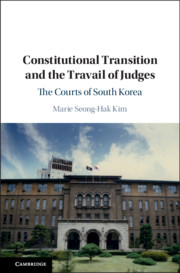
-
Select format
-
- Publisher:
- Cambridge University Press
- Publication date:
- July 2019
- June 2019
- ISBN:
- 9781108633543
- 9781108474894
- 9781108465571
- Dimensions:
- (228 x 152 mm)
- Weight & Pages:
- 0.65kg, 362 Pages
- Dimensions:
- (229 x 152 mm)
- Weight & Pages:
- 0.536kg, 362 Pages
You may already have access via personal or institutional login
Book description
This book looks at the history of the courts in South Korea from 1945 to the contemporary period. It sets forth the evolution of the judicial process and jurisprudence in the context of the nation's political and constitutional transitions. The focus is on constitutional authoritarianism in the 1970s under President Park Chung Hee, when judges faced a positivist crisis as their capacity to protect individual rights and restrain the government was impaired by the constitutional language. Caught between the contending duties of implementing the law and pursuing justice, the judges adhered to formal legal rationality and preserved the fundamental constitutional order, which eventually proved essential in the nation's democratization in the late 1980s. Addressing both democratic and authoritarian rule of law, this volume prompts fresh debate on judicial restraint and engagement in comparative perspectives.
Contents
Metrics
Altmetric attention score
Full text views
Full text views help Loading metrics...
Loading metrics...
* Views captured on Cambridge Core between #date#. This data will be updated every 24 hours.
Usage data cannot currently be displayed.
Accessibility standard: Unknown
Why this information is here
This section outlines the accessibility features of this content - including support for screen readers, full keyboard navigation and high-contrast display options. This may not be relevant for you.
Accessibility Information
Accessibility compliance for the PDF of this book is currently unknown and may be updated in the future.


